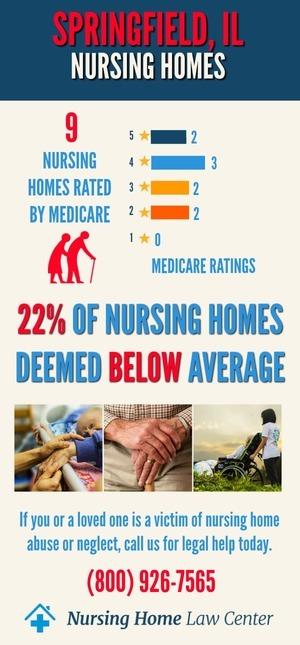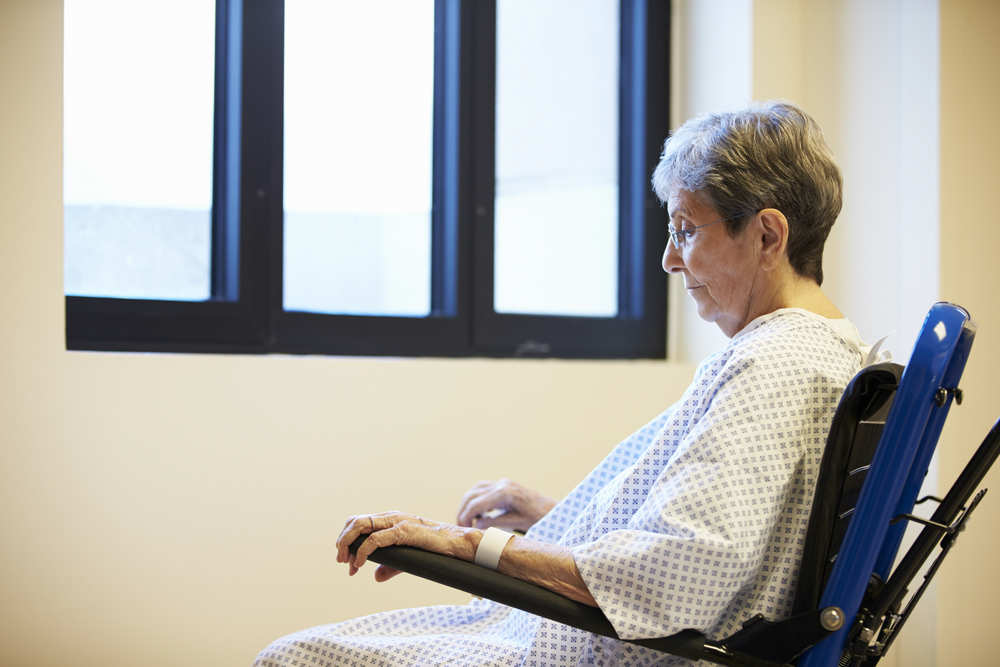The Nursing Home Law Center is committed to providing the legal resources necessary to hold negligent facilities accountable.
Springfield Nursing Home Abuse Lawyer
Compensation for Elder Abuse and Nursing Home Injuries in Springfield, IL

Licensed in Illinois
If your loved one has suffered abuse or neglect in a long-term care facility, a Springfield nursing home abuse lawyer can help your family hold the facility accountable.
At Nursing Home Law Center, our attorneys have handled serious cases of elder abuse throughout Illinois, recovering millions for families devastated by neglect, sexual abuse, and medical negligence in nursing homes and assisted living facilities.
We understand how difficult it is to trust a facility with your elderly loved one’s care, only to discover that trust has been broken. When abuse occurs, we’re here to help you pursue justice and full compensation.
We can help you take legal action against facilities such as:
- Arcadia Care on the Hill
- Avenues at Springfield
- Regency Care
- Springfield Suites Rehab and Nursing
- Arc at Sangamon Valley
- Concordia Village Care Center
Recent Nursing Home Case Settlements
- $2.15 million recovered for the family of a resident who developed fatal bed sores due to untreated pressure injuries and nursing home negligence.
- $2.33 million awarded in a sexual abuse case involving a staff member at a skilled nursing facility who assaulted a vulnerable dementia patient.
- $1.25 million settlement reached after a choking incident led to the wrongful death of a resident left unsupervised during meals.
- $735,000 recovered for a nursing home patient who suffered spinal injuries and a broken leg after falling from an unattended wheelchair.
- $1.7 million settlement for a resident who sustained severe head trauma due to repeated falls caused by lack of supervision.

Nursing Home Abuse and Neglect Statistics in Springfield, IL

Springfield nursing home residents and their families should be aware of the troubling care statistics in the area. Based on recent CMS data, out of six nursing homes in Springfield, only one facility earned an above-average rating. Another was rated average. The remaining four facilities fell below that standard.
Specifically, two facilities received much below average scores, indicating serious performance deficiencies. Two others were rated below average. In fact, two of the six facilities listed have been formally cited for nursing home abuse or neglect.
Overall, this means that two-thirds of Springfield nursing homes listed are performing below acceptable standards, and one-third have documented cases of abuse. For families seeking safe, compassionate care in Central Illinois, these figures highlight the importance of vigilance—and of knowing when to contact a Springfield nursing home abuse lawyer to protect their loved ones.
What Is Considered Nursing Home Abuse?
Nursing home abuse includes any act or failure to act that causes harm, pain, or distress to a nursing home resident. These harms can be committed by nursing home staff, other residents, or even outside caregivers.
Common Forms of Nursing Home Abuse in Springfield
In Springfield, nursing home abuse and neglect often take the following forms:
- Physical abuse, such as hitting, pushing, or improper restraint
- Emotional abuse, including verbal attacks, humiliation, or threats
- Sexual abuse, which may involve unwanted contact or exploitation
- Financial exploitation, like theft or manipulation of accounts
- Neglect, such as failing to provide food, hygiene, or medical care
- Wrongful death resulting from abuse or lack of appropriate care
These types of abuse can stem from intentional harm, reckless oversight, or ongoing negligence within a nursing home facility.

Signs of Elder Abuse Among Springfield Nursing Home Residents
Elder abuse in nursing homes can take many forms, and it’s often difficult for victims to speak out due to fear, confusion, or cognitive impairments. Family members and caregivers need to be aware of the warning signs that may indicate nursing home abuse or neglect. Below are some common indicators of elder abuse:
- Unexplained bruises, cuts, or welts on the body;
- Broken bones or fractures, often from falls or being roughly handled;
- Signs of restraint, such as rope marks or bruises on the wrists or ankles;
- Bedsores or pressure ulcers, which may result from neglect or improper care;
- Mood swings, anxiety, or depression, which can indicate psychological abuse;
- Fearfulness around certain nursing home staff members or residents;
- Soiled clothing or bed linens;
- Poor personal hygiene, such as unwashed hair, skin, or untreated wounds;
- Malnutrition or dehydration, indicated by weight loss or signs of poor physical health;
- Unsanitary or unsafe living conditions in the living facility;
- Missing personal belongings or money;
- Sudden changes to wills, powers of attorney, or other financial documents;
- Suspicious changes in the resident’s financial behavior or spending patterns;
- Emotional trauma, social isolation, or refusing medical treatment.
Common Injuries in Springfield Nursing Home Abuse and Neglect Cases
Nursing home injuries in Springfield often stem from serious cases of nursing home abuse, neglect, or medical malpractice.
Pressure Sores
Bedsores occur when elderly residents are left in the same position for extended periods without being repositioned. These injuries are frequently linked to nursing home negligence, particularly when staff fail to conduct regular skin assessments or provide timely medical treatment.
Bedsores are preventable and often considered nursing home abuse when they result from poor care practices, such as inadequate nutrition, dehydration, or failure to change bedding regularly.
Falls
These accidents may happen when nursing home residents are not properly supervised or when nursing facilities lack safety measures. Resident falls can lead to severe injuries like broken bones or head trauma and may indicate neglect cases or nursing home staffing issues.
In some situations, the improper use of medical equipment like Hoyer lifts further increases injury risks. These incidents are especially dangerous for residents with cognitive impairments or mobility challenges.
Infections
Many infections, such as urinary tract infections and respiratory infections, can be prevented with proper hygiene and monitoring. When left untreated, they can lead to long-term suffering or even death, making them a critical sign of nursing home negligence.
Improper Medication Administration
Whether it’s skipped doses, giving the wrong medication, or failure to monitor side effects, medication errors may amount to medical malpractice. If a resident is harmed due to mistakes in administering treatment, it’s essential to secure their medical records and consult a nursing home abuse lawyer.
Other Injuries Due to Nursing Home Abuse or Neglect
In addition to bed sores, infections, and falls, elderly residents in Springfield facilities may suffer a wide range of other nursing home injuries due to abuse or neglect, such as:
- Scars or disfigurement
- Broken bones
- Spinal fractures
- Burn injuries
- Broken neck and back injuries
- Joint dislocations or separations
- Lacerations
- Exposure to extreme temperatures (elopement)
- Internal organ injuries
- Vision or hearing loss
- Nerve damage
- Death

Springfield Nursing Home Residents’ Legal Rights
Nursing home residents in Springfield, Illinois, are protected by a range of state and federal laws designed to ensure their safety, dignity, and access to proper care. Chief among these is the Illinois Nursing Home Care Act (210 ILCS 45/), which outlines the duties of long-term care facilities and the legal rights of their residents.
This statute mandates that every nursing home resident has the right to be free from abuse and neglect. Facilities are required to provide adequate medical treatment, ensure sanitary living conditions, and protect residents from known safety risks.
Under Illinois law, nursing home facilities must maintain enough qualified staff to meet residents’ individual care plans and are obligated to respond promptly to changes in a patient’s condition.
Reporting Elder Abuse and Neglect in Springfield Nursing Facilities
If a facility violates these duties, residents—or their legal representatives—may file complaints with the Illinois Department of Public Health (IDPH), which oversees and investigates allegations of abuse and regulatory violations. The IDPH provides a 24/7 Nursing Home Hotline at 1-800-252-4343 for suspected abuse or neglect.
Additionally, under federal law, residents in Medicare- or Medicaid-certified facilities are entitled to protections under the Nursing Home Reform Act (part of the Omnibus Budget Reconciliation Act of 1987), including the right to participate in their care, voice grievances without retaliation, and live in a safe, supportive environment.
Compensation Awarded to Victims of Nursing Home Abuse
Some of the most common damages awarded in nursing home abuse personal injury cases include:
- Past pain and suffering related to nursing home injuries
- Future pain and suffering based on diminished quality of life
- Medical bills for treatment required as a result of abuse or neglect
- Costs of future medical care, such as specialist visits, therapies, or rehabilitation
- Increased expenses for higher-level or long-term care due to nursing home negligence
- Equipment costs, including wheelchairs, lifts, or assistive devices
- Emotional distress caused by abuse or witnessing neglect of other residents
- Loss of companionship or consortium for affected family members
- Lost wages or earning potential, if the victim was still contributing income
- Funeral and burial expenses in wrongful death cases
- Financial losses due to theft, fraud, or financial exploitation
- Any other damages revealed during a legal investigation or personal injury claim
Choosing the Right Springfield Nursing Home Abuse Lawyer
Finding the right Springfield nursing home abuse lawyer means choosing someone experienced in nursing home negligence and familiar with Illinois law.
The ideal Springfield nursing home abuse lawyer should have extensive experience handling similar nursing home abuse cases and a clear understanding of Illinois nursing home laws. They should personally manage your case rather than passing it off to less experienced associates.
A strong candidate will be able to interpret complex medical records and assist with filing reports to the proper authorities. They should also have a solid track record of resolving claims through both settlements and, when necessary, taking cases to trial. Look for a law firm that offers a free consultation and works on a contingency fee basis—so you pay nothing unless they win your case.

Understanding the Nursing Home Abuse Lawsuit Process
Filing a nursing home abuse lawsuit in Illinois involves several critical steps. The process typically begins with an initial consultation, during which a nursing home abuse attorney will review the facts of the case, examine medical records, and determine whether a viable claim exists under state law.
If a case is warranted, the attorney will initiate a thorough investigation. This includes gathering medical documentation, interviewing witnesses, and collecting reports, facility records, and other evidence that demonstrate signs of abuse, neglect, or mistreatment.
Once sufficient evidence is collected, the attorney will file the lawsuit, ensuring compliance with the Illinois statute of limitations (735 ILCS 5/13-202). If the case doesn’t settle through negotiations or mediation, it proceeds to trial, where both sides present their arguments. A judge or jury then determines liability and the amount of compensation owed to the victim and their family.
How Our Springfield Nursing Home Abuse Attorneys Can Help
At Nursing Home Law Center, our Springfield nursing home abuse lawyers have extensive experience handling claims involving nursing home neglect, abuse, and wrongful death. Our law firm focuses solely on these cases and knows how to build strong claims supported by medical records and facility documentation.
We begin with a free consultation to evaluate your legal options. If we take your case, our team will handle every step, from investigation to filing the claim and negotiating a fair settlement. If needed, we’re fully prepared to represent your family member at trial and pursue maximum compensation.
Consult a Springfield Nursing Home Abuse Lawyer Near You!
At Nursing Home Law Center, our experienced team of nursing home abuse lawyers is dedicated to securing justice for victims of elder abuse and neglect. With a proven track record of handling complex cases across Central Illinois nursing homes, we are committed to holding assisted living facilities accountable for their negligence.
Our legal team offers compassionate support while aggressively pursuing the compensation your loved one and family members deserve, including damages for medical bills, emotional distress, and other losses.
If you suspect that your loved one has suffered nursing home abuse in Springfield, contact us today for a free consultation to discuss your case and explore your legal options. We are ready to help you take the first steps toward seeking justice and ensuring the responsible parties are held accountable.
Contact our law firm at (800) 926-7565 or fill out our contact form.

All content undergoes a thorough legal review by our experienced attorneys.
Jonathan Rosenfeld is a leading Chicago nursing home injury lawyer with 25 years of experience focused on elder abuse litigation. Recognized for his dedication, he has received recognition from Illinois Trial Lawyers, Million Dollar Advocates, and Super Lawyers.

